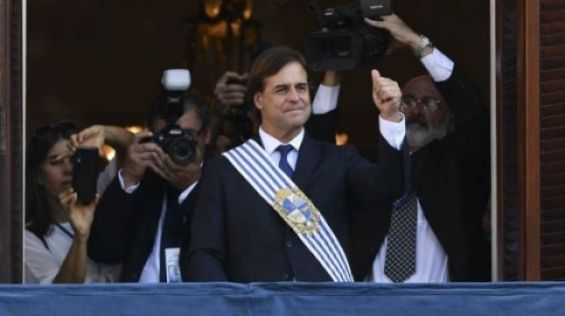On Sunday, the capital Montevideo hosted the inauguration ceremony for the new Uruguayan president Luis Lacalle Pou. King Felipe VI of Spain, the President of Colombia Ivan Duque, the Brazilian President Jair Bolsonaro, the President of Chile Sebastián Piñera and several other heads of state and government representatives attended the event.
While Algeria sent the president of its National Congress Slimane Chenine and South Africa its ambassador Phumelele Gwala to attend the ceremony, Morocco sent the President of the House of Councilors Hakim Benchamach to represent the country.
Speaking to the Moroccan news agency (MAP), Benchamach who was received at the Estévez Palacio by the Uruguayan president said that Pou «expressed his willingness to develop relations of cooperation» with Morocco.
This new step comes after Ernesto Talvi, a Uruguayan politician who is tipped to serve as the country’s Foreign Minister, gave Moroccan officials signs of Uruguay distancing itself from the Polisario Front and «why not» freezings recognition of the so-called «SADR».
«Our relations are with the states and not with the leaders. They are not based on affinities but on interests», said Talvi while voicing the main objectives of his foreign policy in February.
The Polisario Front boycotts Luis Lacalles Pou’s inauguration
While Morocco sent Benchamach to attend Pou’s inauguration, the Polisario Front boycotted the event. Uruguay and Brahim Ghali’s movement had maintained «diplomatic relations» since 2005.
According to the list, which includes the names of the heads of state and senior officials that attended the ceremony, the separatist movement did not take part in this inauguration.
This means that the Polisario expected this change in the foreign policy of this Latin American country since the announcement of the departure of the left-wing coalition «Frente Amplio» (Enlarged Front). The pro-Polisario party spent 15 years in power, before losing the November 24 election. It was in December 2005 that Uruguay, headed by Tabare Vazquez at the time, had recognized the «SADR».
This recognition may change in the coming weeks. Indeed, the newly-elected Montevideo authorities share with Rabat the same positions on several regional issues, including that of Venezuela. Moreover, the political situation in Caracas is still hampering Morocco’s diplomatic breakthrough on this part of the continent, with a pro-Polisario Nicolas Maduro clinging on to power while Juan Guaido is known for being close to Morocco.
In Bolivia, the new interim government had announced, last January, that it was suspending its recognition of the self-proclaimed «SADR». Morocco recognized the country’s interim president a few days later. The November 10 coup against former President Evo Morales was ultimately a blessed opportunity for the Kingdom.
However, in Latin America and the Caribbean, other countries still recognize «SADR», such as Mexico, Belize, Nicaragua, Guyana and Trinidad and Tobago.





 chargement...
chargement...













